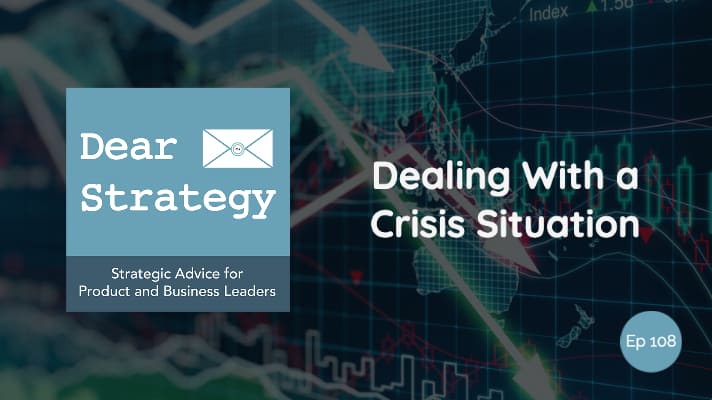On this special episode of Dear Strategy, we talk about why long-term planning becomes more important than ever during times of crisis. When unexpected events happen, many companies may actually be deterred from thinking about the future because everything in the present seems so uncertain. But companies that take the time to think past a crisis may just find themselves with a competitive advantage on the other side of the horizon.
These are certainly emotional times. For those of you who may be reading this sometime in the future, I am writing this post at the end of March 2020 – right in the middle of the COVID-19 pandemic that is currently working its way through just about every part of our globe. I happen to be located in the New York metropolitan area so, at least at the moment, we appear to be right in the middle of all this. But I’m trying to stay safe and, maybe just as importantly, optimistic, which is why I wanted to interrupt our normally scheduled broadcast to talk about this important topic.
Before I go too far in written form, I want to say that I recorded an unusually lengthy podcast episode (clocking in at nearly 25 minutes) that represents what I want to say on this topic much more comprehensively then I’ll probably be able to write it. The written word is great, but there’s also something to be said about speaking from the heart – which is what I tried to do on this week’s episode. With that said, I’ll try to capture the gist of it in as summarized a form as I can.
When faced with a crisis, we humans tend to spring into action. And that, by and large, is a good thing. That means we put everything else aside so that we can effectively deal with the situation that needs our attention the most.
It follows, then, that companies – which are nothing more than collections of humans – tend to do the same thing. And that’s exactly what we’re seeing in this current time of crisis.
Now, to be clear, there are many different types of crises that can be faced – from health to emotional to financial – and, unfortunately, this Coronavirus situation tends to hit on just about all of them. But the one that I’m talking about here is the economic crisis that most companies around the world are currently facing. That’s not to diminish the health and emotional issues that go right along with it. But I want to stick with what I know – and what I know is that companies are almost universally being smacked right in their pocketbooks as a result of what we’re all currently facing.
Given the natural human reaction that I talked about above, it’s no surprise that most companies are jumping into emergency mode – trying to find quick and effective ways to overcome the financial crisis that they’ve suddenly found themselves in. And that’s just as it should be, because a massive wrench has just been launched right into the guts of all our longer-term plans. So companies need to fight to stay alive. And that’s exactly what they’re doing.
“…a massive wrench has just been launched right into the guts of all our longer-term plans.”
But, as we all try to navigate through these highly uncertain times, there are two pieces of advice that I recommend companies try to follow, if only to keep themselves focused on the more positive times that are sure to come. They are:
- As you fight your way through this short-term crisis, try to do it in a focused way. Even though your goals may have shifted from a long-term to a short-term view, all the same strategic steps that we always talk about still apply. In other words, make sure you do your analysis on your company, your customers, and your competitors. Make sure you set your goals, lay out your strategic options, and choose the right actions that will allow you to achieve your goals. And make sure you understand what investments you need to make, what results you’re likely to get, and what actions are and aren’t working for you so that you can adjust your plan along the way. Yes – the timeframe for your temporary new strategy is going to be much, much shorter. But the steps for devising it will all still be the same.
- As you’re executing against your shorter-term plan, try to take time to think about your longer-term plan as well. I know this one can be a challenge because most companies will be taking an “all hands on deck” approach to fighting through whatever issues they’re currently facing. But there is a tremendous opportunity for companies in crisis-mode to also be thinking about what that crisis might translate into when it’s all said in done. What new capabilities might they develop? What new customer needs might arise? What will the revised competitive and industry landscape look like? These are all questions that companies need to be asking themselves. And this need becomes even more magnified when everyone in the world happens to be going through the same crisis at the same time. The point is that crisis brings about change, and change brings about opportunities. And the companies who are first to identify and seize on those opportunities are the ones that will ultimately come out on top – not just for the sake of the companies, but for the sake of the customers that will ultimately be benefitting from whatever those companies bring to market.
So what does all of this mean? Simple. It means that you shouldn’t abandon your planning process during a time of crisis. If anything, you should be doubling down on it. The last thing you want to be, especially in a time of crisis, is random. Random acts represent wasted energy, which is exactly what you don’t need when times are tough. What you do need is to be sure that every move you make and every action you take is focused on some goal that is tied to some bigger picture view of what you are trying to achieve.
That’s how successful companies respond to a crisis. And that’s exactly what the world needs most when things aren’t going so well.
Listen to the podcast episode
Dear Strategy: Episode 108

Are you interested in strategy workshops for your product managers or business leaders? If so, please be sure to visit Strategy Generation Company by clicking the link below:
 Bob Caporale is the founder of Strategy Generation Company, the author of Creative Strategy Generation and the host of the Dear Strategy podcast. You can learn more about his work by visiting bobcaporale.com.
Bob Caporale is the founder of Strategy Generation Company, the author of Creative Strategy Generation and the host of the Dear Strategy podcast. You can learn more about his work by visiting bobcaporale.com.







